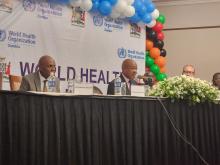Healthy Beginnings, Hopeful Futures: WHO Zambia Celebrates World Health Day with Focus on Maternal and Newborn Health
On April 7th, WHO Zambia hosted a significant advocacy meeting at the Taj Pamodzi Hotel to commemorate World Health Day. This year’s theme, “Healthy Beginnings, Hopeful Futures,” emphasizes the importance of maternal and newborn health and highlights the need for more investments in quality healthcare services to ensure a healthy start for mothers and their babies.
The event brought together policy makers, health care providers, advocates, and civil society organizations to discuss initiatives to improve maternal and newborn outcomes in Zambia.
Keynote speakers included the Acting Minister of Health, Hon. Douglas Siakalima, who stressed the importance of maternal and child health as a cornerstone of the nation’s health strategy. “When mothers receive quality health care, they are empowered to give their children a healthy start in life, creating a ripple effect that influences the health of families, communities and our nation as a whole,” stated Hon Siakalima.
The meeting underscored Zambia’s commitment to enhancing maternal and newborn health services through improved healthcare infrastructure, training healthcare professionals, and improving the availability of essential medicines.
One of the event's highlights was the testimony of Emma Zulu, a mother from Rufunsa District. Emma shared her experience of receiving timely and effective antenatal care, which helped her manage her low blood pressure and ultimately gave birth to a healthy baby. Her story exemplifies the positive impact of quality maternal health services on individual lives.
The World Health Organization Country Representative, Dr Clement Peter Lasuba, emphasized the need for more strategies, investments, collaboration, and commitment to prevent maternal and neonatal deaths. “Let us unite our efforts and invest in high impact interventions like emergency obstetric and neonatal care, improved antenatal and postnatal services, and strengthening the capacity of healthcare providers including midwives, nurses, and community health workers to ensure skilled care at birth, this will help us reduce and prevent deaths,” Dr Lasuba stated.
According to the Zambia Demographic Health Survey, maternal deaths have reduced from 278 per 100,000 live births in 2018 to 187 per 100,000 live births in 2024. Similarly, neonatal mortality has declined from 24 per 1,000 live births in 2018 to 17 per 1,000 live births in 2024.
To continue this trajectory, the Republican President. Mr Hakainde Hichilema has prioritized maternal health as a key legacy for his administration. He has directed efforts to build maternal health infrastructure, ensure the provision of clean water, and increase the availability of medicines, medical equipment, and transport. These initiatives aim to reduce maternal and neonatal mortality rates and improve overall health outcomes for mothers and newborns.
The advocacy meeting also focused on engaging communities, empowering women, and raising awareness about the importance of maternal health. Healthcare providers, academia, health cooperating partners, and civil society had the opportunity to exhibit some of their work to enhance healthcare access, address health disparities, and foster a healthier environment for future generations.
The event underscored WHO Zambia's commitment to achieving health equity and ensuring everyone can lead a healthy life.


